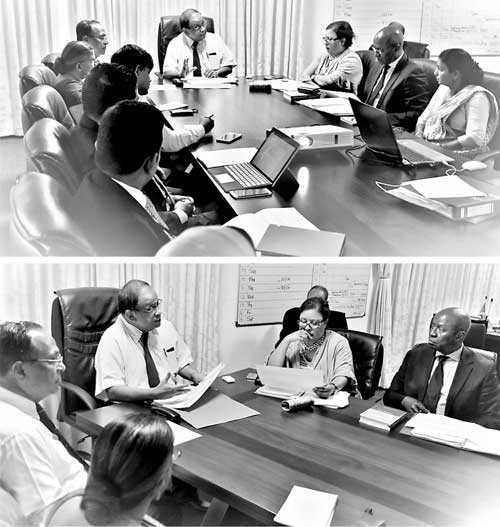Thursday Feb 26, 2026
Thursday Feb 26, 2026
Saturday, 8 July 2017 00:00 - - {{hitsCtrl.values.hits}}
Former Deputy Chief Justice of South Africa Dikgang Moseneke, Commonwealth Secretariat Head of Human Rights Advocate Karen McKenzie and Political Counsellor of South Africa Johannes Van Niekerk visited the Ministry of National Integration and Reconciliation and shared South African experiences on reconciliation.
“In our system everybody has a right to be a Buddhist, be a Muslim, to belong to a Hindu religion or even no religion,” said Moseneke. Moseneke stated that the Constitution specially protects these rights, emphasising that “unity in diversity, mutual respect and coexistence” were important elements for reconciliation. According to Moseneke, most of the violence in South Africa was due to poverty, exclusion and the disintegration of families.
Moseneke also spoke about South Africa’s experiences reaching a consensus on the Constitution. However, although there were challenges, the common values of unity in diversity, reconciliation, democracy, fundamental rights and freedom helped to overcome these challenges. The Constitution of South Africa recognised people’s rights irrespective of religion or ethnicity, giving protection to minorities by anchoring itself in the principles of equity and dignity.
The Truth and Reconciliation Commission in South Africa examined how people were killed or had disappeared and that was a healing process to address the pain. Reparation for victims is one of the pillars in transitional justice that helped victims receive compensation. Transitional justice is different from normal justice and it was aimed at buying peace.
Amnesty was given to ex-combatants and they were socially integrated. Female participation in all areas of transitional justice and constitutional reform was given importance. At present in South Africa, there is 35-40% female representation in Parliament, revealed Moseneke.
The non-recurrence of violence and memorialisation were also important in the reconciliation process. Local peace committees in South Africa helped limit violence and tensions and solve pressing issues. Moseneke added that gaining a peaceful and sustainable outcome from the conflict required comprehensive understanding of the root causes of conflict. Conflict mediation and conflict resolution in hotspot districts was also important. In addition, the former Deputy Chief Justice outlined that healing and reparation were vital for reconciliation.
The Ministry of National Integration and Reconciliation presented the visiting officials with its Reconciliation Action Plan (RAP). The intervention and initiatives were commended by Moseneke and McKenzie.